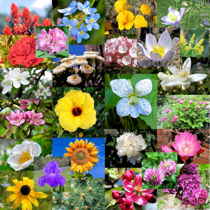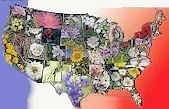
North Carolina Symbols
North Carolina State Flower
Dogwood

(Cornus florida)
Adopted in 1941.
The General Assembly of 1941 designated the dogwood, (Cornus florida,) also know as boxwood and cornel as North Carolina State Flower.
The flowering dogwood (Cornus florida) is one of America's most popular ornamental trees. Because of its abundance throughout the state, the dogwood was able to fend off its most competitive opponent, the flame azalea, at the last minute. On March 15, 1941, the North Carolina Legislature approved the dogwood as the state's official flower.
North Carolina State Flower: Dogwood

Known to most people simply as dogwood, it has other common names, including boxwood and cornel. The species name "florida' is Latin for flowering, but the showy petal-like bracts are not in fact flowers. The bright red fruit of this fast-growing short-lived tree are poisonous to humans but provide a great variety of wildlife with food. The wood is smooth, hard and close-textured and now used for specialty products.
Characteristics of the Dogwood
- Flower: Flowers are highly modified leaves that perform reproductive functions for plants that bear them. A flower petal is merely a special
leaf that typically through brightly colored pigment may attract a pollinator. The actual reproductive work of the flower is conducted by the stamens
(which bear pollen) and the pistil (which receives the pollen and allows it to contact the flower ovary, where a fruit is produced).
The small flower clusters on the Flowering Dogwood are surrounded by 4 large, showy bracts that are often mistaken as petals. Each quarter-inch flower has four tightly curved petals, plus two stamens and a single pistil. Flowers that have dropped their petals is a sign they likely have been pollinated. Eventually, after all the white bracts and tiny petals have fallen, the remaining flower parts will wither and turn brown, giving rise to several fertilized ovaries, the bright green berries that turn scarlet as they ripen.
Flowering dogwood blooms in either white or pink, depending on the cultivar, and 2 inches in diameter. Appearing March to April in the south, June in the north.

- Leaf:
Opposite, simple, arcuately veined, 3 to 6 inches long, oval in shape with an entire margin.
- Fruit: A shiny, oval red drupe, 1/4 to 1/2 inch long, in clusters of 3 to 4. Maturing in September to October.
- Twig: Slender, green or purple, later turning gray, often with a glaucous bloom. The terminal flower buds are clove-shaped, vegetative
buds resemble a cat claw.
- Bark: Gray when young, turning very scaly to blocky.
- Form: A small tree with a short trunk that branches low, producing a flat-topped crown. Branches are opposite, and assume a "candelabra" appearance.
The North Carolina General Statutes
The law designating the dogwood as the official North Carolina state flower is found in the North Carolina General Statutes, Chapter 145, Section 145-1.
CHAPTER 145. State Symbols and Other Official Adoptions.
SECTION 145-1.
§ 145-1. State flower.
The dogwood is hereby adopted as the official flower of the State of North Carolina. (1941, c. 289.)
Taxonomic Hierarchy: Dogwood
Kingdom: Plantae - Plants
Subkingdom: Tracheobionta - Vascular plants
Superdivision: Spermatophyta - Seed plants
Division: Magnoliophyta - Flowering plants
Class: Magnoliopsida - Dicotyledons
Subclass: Rosidae
Order: Cornales
Family: Cornaceae - Dogwood family
Genus: Cornus L. - dogwood
Species: Cornus florida L. - flowering dogwood
State Floral Emblems







